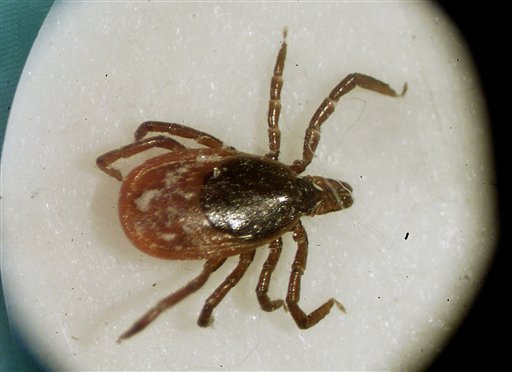The ticks were waiting for winter to end too.
While Lyme disease cases are down so far this year compared to this time in 2014, the ticks that carry the disease did not die off and were merely dormant until the snow melted.
Maine will likely still experience a tick-filled summer, as the voluminous snow that covered the state this winter merely acted as an insulating blanket for the ticks, experts said.
“Those ticks were quite fat and happy under the snow, but they were not going to start coming out until the snow was gone,” said Jim Dill, pest management specialist at the University of Maine Cooperative Extension. “It’s going to pick up pretty quickly. The population looks pretty strong right now.”
Through May 26 this year, there were 89 reported cases of Lyme disease, according to the Maine Center for Disease Control and Prevention, compared to 166 cases through May 2014. Maine has experienced large increases in Lyme disease in recent years, with 1,388 cases in 2014.
Susan Elias, a researcher with Maine Medical Center Research Institute in Scarborough, said ticks could be more active this spring and summer because the snow was on the ground as late as April in many parts of the state.
“Maybe they started later, but we could see a higher peak of tick activity this summer because they’re coming out in a shorter period of time,” Elias said.
Ticks are hardy and do not die easily from cold weather. It would take weeks of zero-degree or similar temperatures without much snow coverage to kill the ticks.
Elias said the institute is currently doing field work collecting ticks for research, and while information is only anecdotal at this point, the number of ticks appear to be about average compared to recent years. But the deer tick, which carries Lyme disease, has expanded its range and become more common in Maine over the past 20 years, experts say.
Lyme disease has jumped from fewer than 300 cases per year 10 years ago to more than 1,000 every year since 2011, with each year setting a new record in Lyme disease cases.
Meanwhile, some Lyme disease patients are lobbying in support of a bill that would make it easier to obtain controversial treatments for persistent Lyme disease, in which symptoms linger for years after a tick bite. The bill would protect doctors from having sanctions placed on their licenses for prescribing long-term antibiotics to Lyme sufferers. Patients are often traveling out of state, to New Hampshire or other Northeastern states, for the treatments. Scientists disagree over whether long-term antibiotics are effective and whether they may cause harm to the patient.
Victoria Delfino, of Windham, said in 2008 she had to seek treatment in New York for chronic Lyme, after not being able to obtain long-term antibiotics in Maine. She said her health has improved greatly since then.
The bill was recommended out of the labor and commerce committee by a 7-6 vote, with opponents arguing that the state should not get involved.
Joe Lawlor can be contacted at 791-6376 or at:
jlawlor@pressherald.com
Twitter: @joelawlorph
Send questions/comments to the editors.




Success. Please wait for the page to reload. If the page does not reload within 5 seconds, please refresh the page.
Enter your email and password to access comments.
Hi, to comment on stories you must . This profile is in addition to your subscription and website login.
Already have a commenting profile? .
Invalid username/password.
Please check your email to confirm and complete your registration.
Only subscribers are eligible to post comments. Please subscribe or login first for digital access. Here’s why.
Use the form below to reset your password. When you've submitted your account email, we will send an email with a reset code.